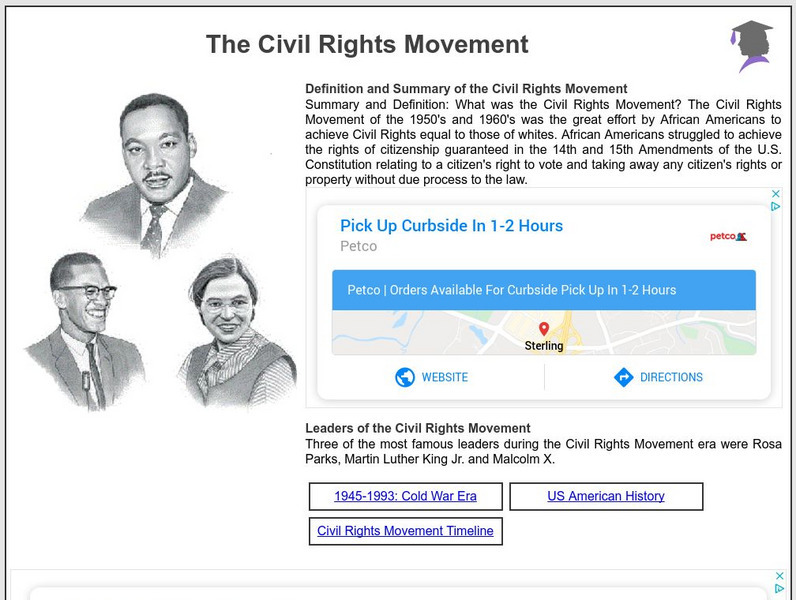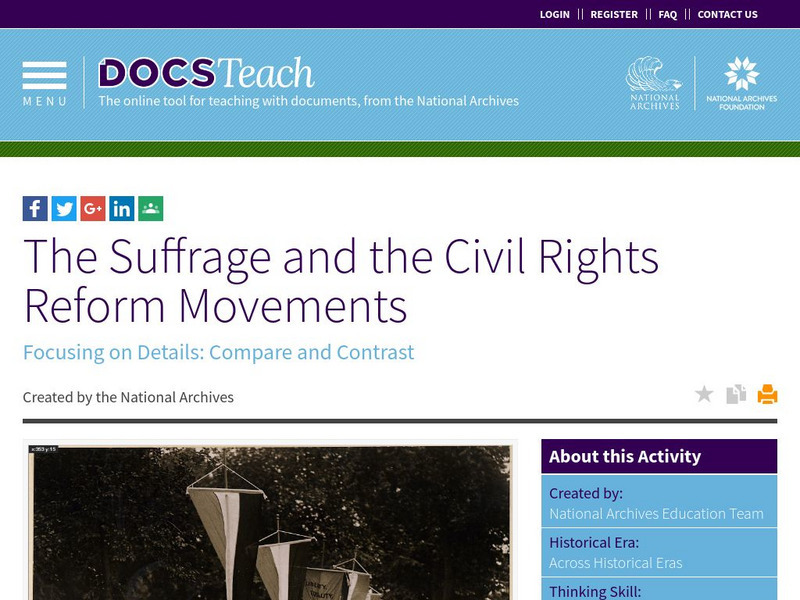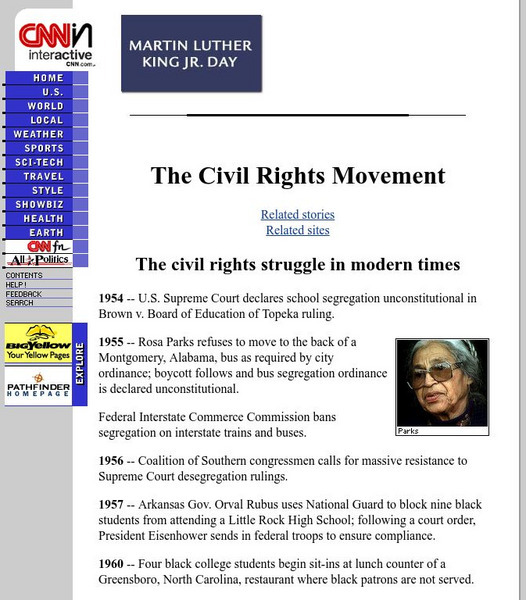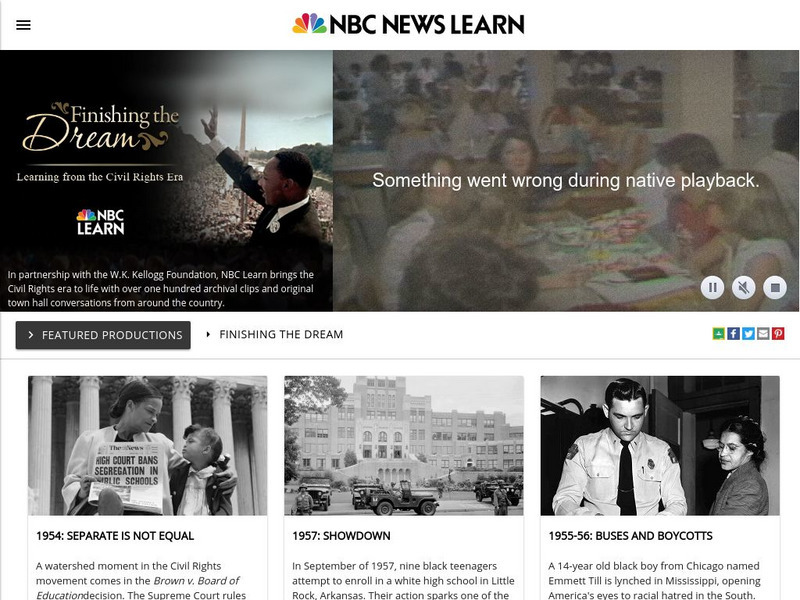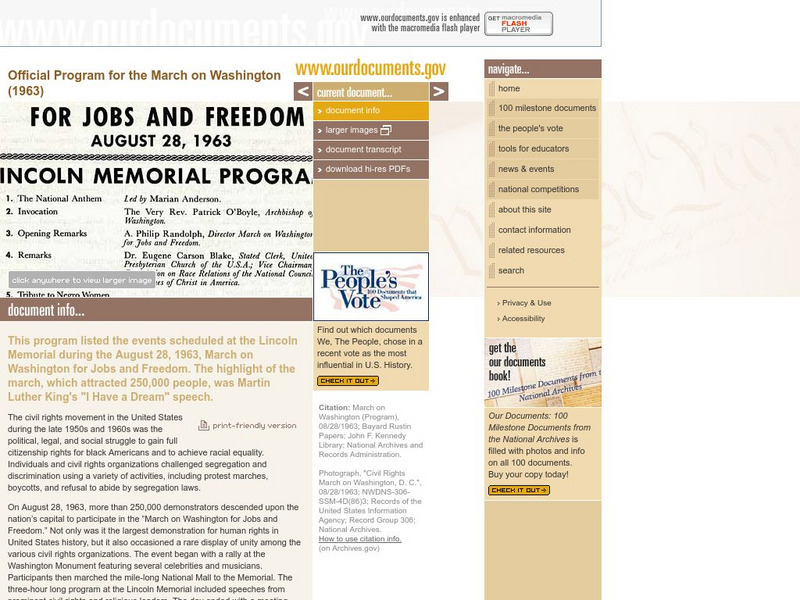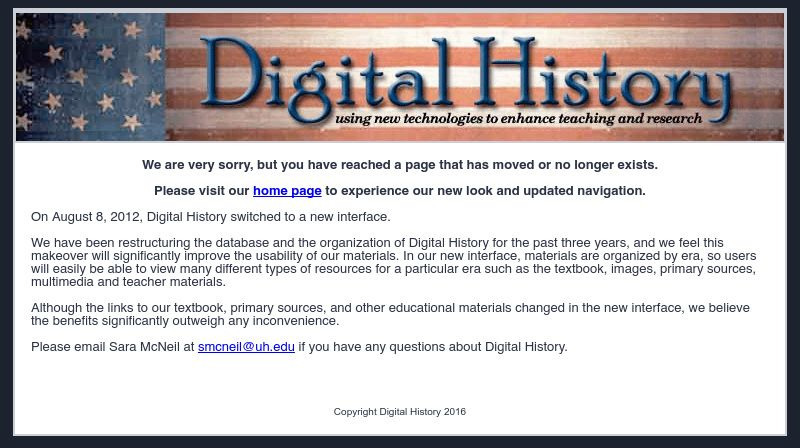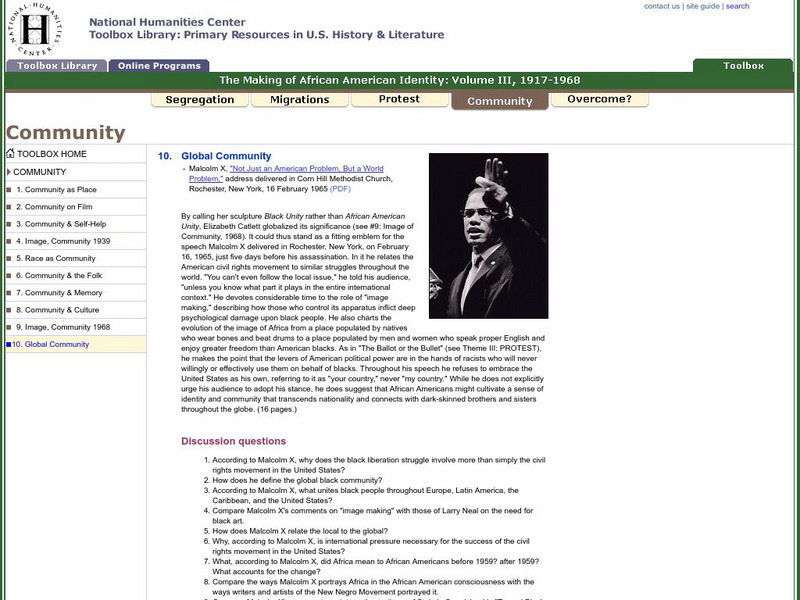Hi, what do you want to do?
Louisiana Department of Education
Louisiana Doe: Louisiana Believes: Social Studies: Grade 4: Civil Rights
This instructional task asks students to explain the impact of the Civil Rights Movement on African Americans.
Other
The American Civil Liberties Union: Crystal Eastman
This article describes the role and responsibility of Crystal Eastman in the Woman's Rights Movement in general and the suffragist movement in particular.
Siteseen
Siteseen: American Historama: Civil Rights Movement
Article details important people, places, and events in the Civil Rights Movement during the 1950s and 1960s.
ClassFlow
Class Flow: Civil Rights Movement
[Free Registration/Login Required] Through this lesson, students identify individual, personal, and political rights (freedom of religion, freedom of speech, right to own property) by analyzing lives of historical African American...
ClassFlow
Class Flow: Civil Rights Movement
[Free Registration/Login Required] This flipchart focuses on the Civil Rights Movement and leaders of the 1950's and the 1960's.
Digital History
Digital History: The Civil Rights Movement Moves North
Summers of the late 1960s was a time of widespread violence and rioting in the nation's major inner cities. What was previously thought of as a problem of the South had spread nation-wide and was now demanding immediate attention.
US National Archives
National Archives: The Suffrage and the Civil Rights Reform Movements
Two reform movements that changed American history - Women's Suffrage and the Civil Rights Movement. View two iconic pictures from these movements and compare and contrast them along with answering critical thinking questions.
Library of Congress
Loc: From Slavery to Civil Rights
This interactive timeline lets students select an era in the history of blacks in United States. Text tells the highlights of the time and primary source materials are linked that pertain as well.
Annenberg Foundation
Annenberg Learner: Democracy in America: Civil Rights: Demanding Equality
This unit embraces those individuals who have brought change to the United States in both social and political equality through a Video on Demand, activities, and other enlightening resources.
PBS
Pbs Learning Media: Civil Rights Activist, Fannie Lou Hamer
A profile of the life and leadership of Fannie Lou Hamer, a civil rights activist best known for her stirring testimony at the 1964 Democratic National Convention.
Digital Public Library of America
Dpla: Activism in the Us
American sociopolitical activism became especially prominent during the period of societal upheaval which began during the 1950s. The African American civil rights movement led the way, soon followed by a substantial anti-war movement...
CNN
Cnn: Covers the Civil Rights Movement
Timeline of the early and modern Civil Rights Movement. This is a good overview to begin your study of the fight for civil rights in America.
NBC
Nbc Learn: Finishing the Dream
A collection of over one hundred archival video clips highlighting significant events in the history of the Civil Rights Movement since the Brown v. Board of Education Supreme Court decision in 1954. There are ten collections covering...
University of Groningen
American History: Outlines: Desegregation
Overview of efforts to overthrow Plessy v Ferguson and desegregate public schools and other places during the Civil Rights Movement.
Other
Vanderbilt University: Heard Library: R. P. Warren: Who Speaks for the Negro?
An extensive archival collection of material that formed the core of Who Speaks for the Negro?, a book Robert Penn Warren published in 1965 of his interviews with prominent African American writers and activists whose ideas were critical...
US National Archives
Our Documents: Official Program for March on Washington(1963)
Contains a copy of the original program for the March on Washington that featured Martin Luther King. Provides a summary of the civil rights movement at that time.
The Newberry Library
Newberry Library: The Struggle for Civil Rights in the Urban North
Learning resource using primary sources in which students study de facto segregation in the North following the Civil War and examine how African-Americans responded to segregation and racism compared to the South.
Digital History
Digital History: Black Nationalism and Black Power
There were two methods of protesting discrimination of African Americans during the Civil Rights Movement: follow Martin Luther King, Jr. or Malcolm X. Find out about the Black Panther Party, Black Nationalism, and Black Power.
TED Talks
Ted: Ted Ed: Martin Luther King, Jr.: "I Have a Dream"
On August 28, 1963, Dr. Martin Luther King, Jr. delivered a speech to hundreds of thousands of Americans at what is known as the March on Washington. This now-famous speech was both an apex and catalyst for the Civil Rights Movement in...
My Hero Project
My Hero: Ruby Bridges
Chosen as a Freedom Hero, Ruby Bridges faced the incredible task of integrating an elementary school during the Civil Rights Movement.
Other
National Civil Rights Museum
Get a glimpse of what is housed in the National Civil Rights Museum in Memphis, Tennessee. The interactive tour highlights the struggle and introduces key historical figures such as Sojourner Truth, Nat Turner, Dred Scott, and Frederick...
PBS
Pbs Learning Media: Primary Source Set: The Black Power Movement
This collection uses primary sources to explore the Black Power Movement.
PBS
Pbs: American Experience: The Murder of Emmett Till
The murder of Emmett Till was a major catalyzing event in the Civil Rights Movement. Here you will find extensive information on the murder, trial, and the ramifications of both.
National Humanities Center
National Humanities Center: Toolbox Library: Global Community, Making of African American Identity: V. 3
On February 16, 1965, in Rochester, New York, Malcolm X delivered a speech that placed African American in a global black community. Just five days before his assassination, he relates the American civil rights movement to similar...







